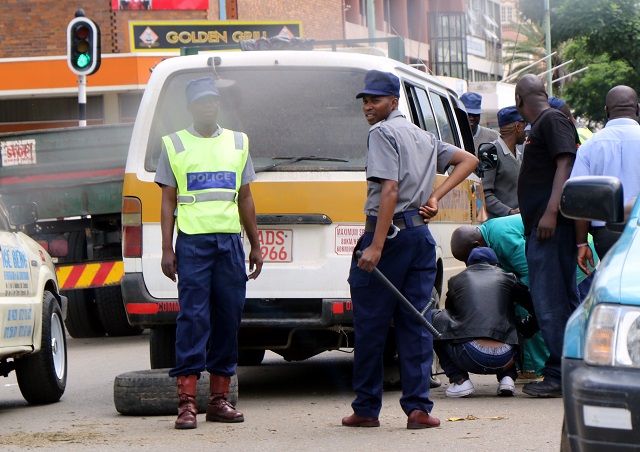Police to use advanced spikes system
Zimbabwean police will no longer be using two-metre-long iron bars bristling with spikes to deflate vehicle tyres in an attempt to stop motorists alleged to have committed a traffic offence, the deputy Home Affairs minister has said.

Deputy minister Obedingwa Mguni told the Senate last week that police will soon be using spikes in a far advanced system.
Mguni said he wanted to copy the South African style of using spikes.
“There is an electronic system that we will introduce when we are integrated which detects a vehicle that may not have paid its licence.
“Then those who are about 400 metres will be telephoned to inform them about this vehicle. That is when the driver will see a spike on the ground when he is approaching,” Mguni said.
“The dispute that I have come across in Zimbabwe most of the times is that — I am not sure whether the taxi driver refuses to stop and then police run to throw the spike.
“If it is like that, we issued a statement that it is illegal to throw a spike on a moving vehicle. “We said this constitutes three years imprisonment for a police officer.
“If it is laid on the road and the driver decides to drive on top of it, that driver is reckless.
“He needs to be charged because he is carrying about 17 people in his vehicle and he does not care to use flat tyres.”
He reiterated that a spike cannot be thrown into a moving vehicle, according to the law. “It must be laid down on the ground to control the vehicle to stop,” he said, responding to MDC Senator Lilian Timveos who said she had seen three officers on police bikes by the traffic light near Holiday Inn who wanted to throw spikes at a commuter omnibus.
Chapter IV, Section 38 of the Criminal Law (Codification and Reform) Act, states: “Any person who — (a) throws or propels or prepares to throw or propel any missile, article or thing at any person, motor vehicle, boat, aircraft or building with the intention or realising that there is a real risk or possibility of causing damage or injury;
“or (b) without lawful excuse, the proof whereof lies on him or her, overturns or attempts to overturn any motor vehicle, boat or aircraft;
“or (c) otherwise than under and in accordance with any other enactment, leaves or places on or over any road anything with the intention or realising that there is a real risk or possibility of obstructing such road or endangering persons using it; shall be guilty of obstructing or endangering the free movement of persons or traffic and liable to a fine not exceeding level 12 or imprisonment for a period not exceeding 10 years or both.”
Responding to a question by Zanu PF Senator Tapera Machingaifa that heavy vehicles should not travel after 6pm in Zimbabwe but they still continue to move after that time, Mguni said:
“My ministry may not be the custodian of that regulation but we are there to enforce. If the ministry of Transport and Infrastructural Development decides to implement that to protect carnages and horrific accidents that are happening on the roads, the police will wait to enforce.
“Remember, we are not the ones who put the regulation which says that vehicles must have licences but police are just enforcing to see that the vehicle pays a licence.
“I heard that the trucks that have been stopped are fuel trucks and not every truck because others can move,” he said.
Masvingo MDC Senator Misheck Marava asked that in light of the reduction of police on the road, how is the deputy minister going to deal with a very huge surplus of police officers.
Mguni said: “We do not have a surplus. We have never employed any more new officers. We said the spot checks — the commissioner general will determine where they have to go and check. There will be high-way patrols.
“They have actually applied to purchase more vehicles so that the police are on the highway patrol. The police cannot be short of having something to do; they have got a lot to do especially on the roads.
“The statistics of Zimbabwe where people die most is not in hospitals.
“It is on the roads and so the police have profiled that we need to stop corruption on the roads, we need to stop these carnages.” Daily News






